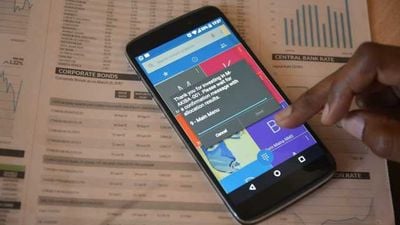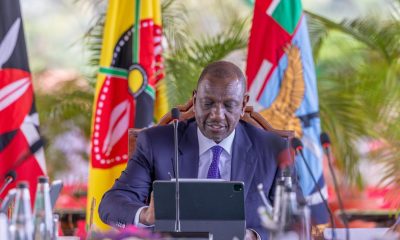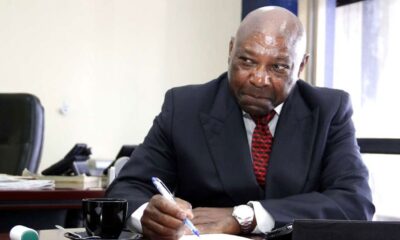Economy
Treasury moves M-Akiba away from NSE to the Central Bank

Kenya’s National Treasury has shifted the issuance of its mobile-based government bond programme, known as M-Akiba, to the Central Bank, away from the Nairobi Securities Exchange and the Central Depository and Settlement Corporation.
This is after the failure of the initial retail bond due to poor timing, low understanding of the product and weak customer care practices that led to under subscription.
The latest policy shift is intended to revive the performance of the debt instrument, which was launched in June 2017 to deepen the Treasury bond market and promote financial inclusion.
“We want M-Akiba to be spearheaded by our fiscal agent, which is really our intention. We want them to be the primary issuer of this instrument. The Central Bank of Kenya (CBK) has better infrastructure, they have better capability and it sits well in the context of financial inclusion, of which the bank is also supportive,” Haron Sirima, a director-in-charge of public debt management at Treasury, told The EastAfrican in an interview last week.
“We have not abandoned it, but we have learnt a number of lessons. CBK would be the most appropriate entity to speak to as the primary issuer of government securities,” he added.
Initial arrangement
Under the initial arrangement, the Central Depository and Settlement Corporation (CDSC) was tasked with being an issuing and paying agent for M-Akiba on behalf of the government, while the NSE was in charge of facilitating the online trading of the bonds through its systems as well as providing customer service support through a helpline.
“M-Akiba was being issued by NSE and CDSC on a pilot basis. Given the positive response we got from that instrument, we felt that it would be most appropriate for it to be issued by the CBK,” said Sirma.
Treasury pays CBK 1.5 percent or up to Ksh3 billion ($27.27 million) in fees for each amount of debt raised from the domestic market through Treasury bills and bonds. When the bond was launched, the aim was that the Ksh 1 billion ($9.09 million) on offer would sell out. It even allowed for a green shoe option to expand it up to Ksh 3.8 billion ($34.54 million).
Although more than 300,000 people registered on the M-Akiba platform atthe initial launch, only 5,988 purchased the bonds, totalling Ksh247.75 million($2.25 million), less than a quarter of what was on offer.
“The objective of this debt instrument is to deepen financial inclusion. So you don’t look at its success in terms of the amount of money that you raise, but more on the coverage or number of individuals who have subscribed to the instrument,” said Sirma.
More Kenyans are expected to participate in government bonds by investing a minimum of Ksh3,000 ($27), which is considerably lower than the Ksh50,000 ($454.54) required to invest in other Treasury bills and bonds.
The cost of buying and selling a Treasury bond in the secondary market on a phone is estimated at 0.335 percent of the value of the transaction, excluding the mobile money transfer charges for loading or withdrawing money from the mobile wallet.
In comparison, the cost for trading in the conventional government bond is 0.0384 percent of the value of the transaction. This comprises brokerage commission (0.024 percent), CDSC Bond levy (0.002 percent), Capital Markets Authority bond levy (0.0015 percent), Investor Compensation Fund bond levy (0.004 percent), NSE Bond levy (0.0035 per cent) and VAT on brokerage commission (0.00336 percent).
Regionally, the Dar es Salaam Stock Exchange is seeking to engage the Ministry of Finance and Planning for the development of micro-savings products.
In 2019, Uganda announced that Cabinet had approved the trading of government securities through mobile phones to boost savings and investment among citizens, and drive economic growth.
Kenya’s National Treasury has decided to shift the issuance of its mobile-based government bond programme popularly known as M-Akiba to the Central Bank away from the Nairobi Securities Exchange (NSE) and the Central Depository and Settlement Corporation (CDSC).
This is after the initial flop largely triggered by poor timing, poor understanding of the product and weak customer care practices leading to massive under subscription of the maiden retail bond.
The EastAfrican has learnt that the latest policy shift is intended to revive the performance of the debt instrument which was launched in June 2017 with a view to deepening treasury bond market and promoting financial inclusion.
“We want M-Akiba to be spear-headed by our fiscal agent (CBK), which is really our intention. We want them to be the primary issuer of this instrument. CBK has got a better infrastructure, they have better capability and it sits well in the context of financial inclusion of which the bank is also supportive,” Haron Sirima, a Director-in-charge of Public Debt Management at the National Treasury told The EastAfrican in an interview last week.
“We have not abandoned it but we have learnt a number of lessons and I think again that is really where CBK would be the most appropriate entity to speak to as the primary issuer of government securities,” added Dr Sirma.
Under the initial arrangement CDSC was tasked with the role of being an issuing and paying agent for M-Akiba bond on behalf of the government while the NSE was in-charge of facilitating the online trading of the bonds through its systems and also providing customer service support through a helpline.
“ M-Akiba was being issued by NSE and CDSC on a pilot basis and given the positive response we got from that instrument we felt that it would be most appropriate for it to be issued by the CBK as primary issuer of government securities,” said Sirma
The National Treasury pays CBK 1.5 percent or up to Ksh3 billion ($27.27 million) in fees for each amount of debt raised from the domestic market through treasury bills and bonds.
According to a survey by Financial Sector Deepening (FSD) Kenya the number of retail customers purchasing the M-Akiba bonds proved to be low despite the much excitement and interest when the bond was piloted and launched on June 30 2017.
The bond was launched with much fanfare and great hopes that the Ksh 1 billion($9.09 million) on offer would also sell out and even allowed for a green shoe option to expand it up to Ksh 3.8 billion($34.54 million) subject to investor appetite.
Although over 300,000 people registered on the M-Akiba platform only 5,988 purchased the bonds during the official launch totaling Ksh 247.75 million($2.25 million), less than a quarter of the Ksh 1 billion($9.09 million) on offer.
However according to the National Treasury the main objective of the M-Akiba bond is not necessarily to raise financing for budgetary support but to promote a national savings culture and enhance financial inclusion.
“ The while objective of this debt instrument is really to deepen financial inclusion so you don’t look at its success in terms of the amount of money that you raise but more on the coverage or number of individuals who have subscribed to the instrument. That is how we measure its success rate,” said Sirma
The idea of the mobile traded government bond was mooted in 2011 by both the National Treasury and the Central Bank to deepen and enhance financial inclusion through leveraging on increased mobile phone penetration to democratize access to formal financial systems for savings and investments.
More Kenyans were expected to participate in Government bonds by investing a minimum Ksh 3,000.00 which is considerably lower in comparison to the minimum Ksh 50,000 ($454.54) required to invest in other Treasury bills and bonds.
Last year (2020) the National Treasury said it would review the cost of trading in government securities to boost the uptake of treasury bonds as an avenue for savings and investments after poor performance of the M-Akiba bond.
Yes those (cost elements) are some of the things that we need to look at but you see you can’t look at M-Akiba Bond independently from the conventional bond because it is one and the same thing any way. They are all government securities,” Sirima told The EastAfrican last year (2020).
“You know the Public Finance Management (PFM) law requires that in raising resources through borrowing you need to look at both the cost and risk elements. So it is not appropriate to just look at the cost element independent of the risk.”
Total cost for buying and selling a treasury bond in the secondary market through the phone was estimated at 0.335 percent of the value of the transaction excluding the normal mobile money transfer charges for loading or withdrawing money from the mobile wallet.
On the other hand the total cost to an investor for trading in the conventional government bond is estimated at 0.0384 percent of the value of the transaction.
This comprises Brokerage commission (0.024 percent), CDSC Bond levy (0.002 percent), Capital Markets Authority bond levy (0.0015 percent), Investor Compensation Fund bond levy (0.004 percent), NSE Bond levy (0.0035 percent) and Value Added Tax (VAT) on brokerage commission (0.00336 percent
Regionally, Dar es Salaam Stock Exchange (DSE) is seeking to engage the ministry of finance and planning(MOFP) for the development of Micro-savings products popularly known as ‘M-Akiba bonds’ as part of its five-year (2018-2022) growth and development plan.
In 2019 the Ugandan government announced that the cabinet had approved the trading of government securities through mobile phones to boost savings and investment among ordinary Ugandans as well as drive economic growth.
Kenya Insights allows guest blogging, if you want to be published on Kenya’s most authoritative and accurate blog, have an expose, news TIPS, story angles, human interest stories, drop us an email on [email protected] or via Telegram
-

 Grapevine1 week ago
Grapevine1 week agoAlleged Male Lover Claims His Life Is in Danger, Leaks Screenshots and Private Videos Linking SportPesa CEO Ronald Karauri
-

 Lifestyle1 week ago
Lifestyle1 week agoThe General’s Fall: From Barracks To Bankruptcy As Illness Ravages Karangi’s Memory And Empire
-

 Grapevine3 days ago
Grapevine3 days agoRussian Man’s Secret Sex Recordings Ignite Fury as Questions Mount Over Consent and Easy Pick-Ups in Nairobi
-

 Investigations2 weeks ago
Investigations2 weeks agoEpstein Files: Sultan bin Sulayem Bragged on His Closeness to President Uhuru Then His Firm DP World Controversially Won Port Construction in Kenya, Tanzania
-

 Business2 weeks ago
Business2 weeks agoKRA Can Now Tax Unexplained Bank Deposits
-

 Investigations1 week ago
Investigations1 week agoEpstein’s Girlfriend Ghislaine Maxwell Frequently Visited Kenya As Files Reveal Local Secret Links With The Underage Sex Trafficking Ring
-

 News1 week ago
News1 week agoState Agency Exposes Five Top Names Linked To Poor Building Approvals In Nairobi, Recommends Dismissal After City Hall Probe
-

 Investigations16 hours ago
Investigations16 hours agoMulti-Million Dollar Fraud: Three Kenyans Face US Extradition in Massive Cybercrime Conspiracy
























